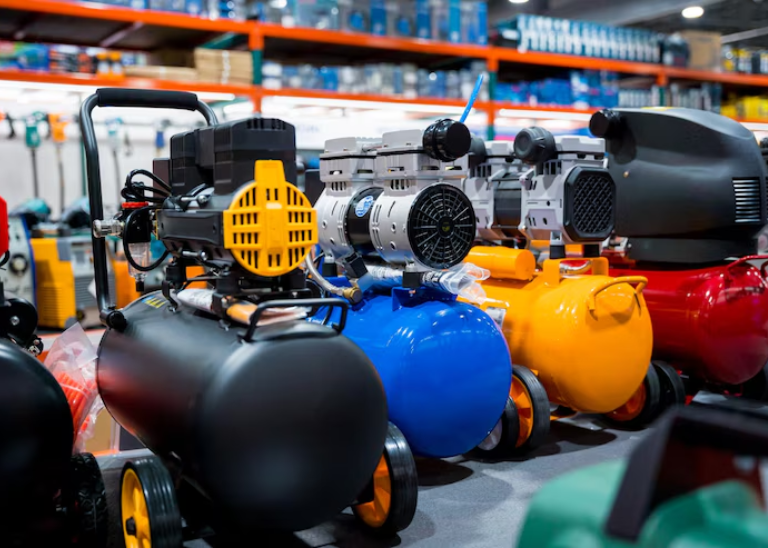7 Must-Have Features in a Top-Tier Air Dryer For Compressor

The use of air dryers in compressor systems is a smart investment for organizations wanting to improve the reliability, efficiency, and quality of their pneumatic operations. Air dryers for compressors ensure the air is clean and dry, helping industries overcome issues caused by moisture contamination and supporting ongoing operational excellence and competitiveness. This blog offers a detailed insight into the top seven features of a dryer for optimum performance.
What Is the Role of Air Dryers in Compressor Systems?
Air dryers play a crucial role in compressor systems by removing moisture and other contaminants from compressed air. Air dryers help protect equipment by ensuring that the compressed air is free from moisture, thus extending the lifespan of components and reducing maintenance costs. In cold environments, moisture in the air can freeze, leading to blockages and damage to equipment. Air dryers prevent this freezing by removing moisture before it condenses and freezes, keeping it safe. Moreover, air dryers help maintain compressed air quality, avoiding product contamination and ensuring consistent quality. By removing moisture, air dryers also improve the overall efficiency of compressor systems. All such benefits make air dryers a crucial component of compressor systems.
Essential Features in a Top-Tier Air Dryer For Compressor
This section will elaborate on the central features to consider when choosing a compressor air dryer.
Dew Point Control
The dew point is the temperature at which air becomes saturated with moisture, leading to condensation. Controlling the dew point reaps numerous benefits, such as:
- It ensures that the compressed air remains dry, preventing condensation and the associated issues such as corrosion, equipment damage, and contamination.
- By controlling the dew point, air dryers prevent moisture in the compressed air from reaching temperatures where it can freeze.
- Dew point control also helps optimize the energy efficiency of air dryers by ensuring that they only consume energy when necessary to maintain the desired moisture level.
- The control mechanisms also ensure that the industry standards and regulations are thoroughly met, helping businesses maintain compliance with legal requirements.
- It optimizes energy efficiency of air dryers by ensuring that they only consume energy when necessary, preventing unnecessary energy consumption and reduces operating costs over time.
- Air dryers with dew point control offer consistent performance regardless of ambient conditions or compressed air demand variations.
Particulate Filtration
Particulate filtration is a critical aspect of air dryers for compressors because it helps ensure that the compressed air is free from solid contaminants such as dust, dirt, rust, and other particles.
- Particulate filtration prevents Solid pollutants from entering the system, preventing it from abrasion, wear, and damage to pneumatic tools, valves, actuators, and other equipment downstream of the compressor.
- By filtering out these particles, air dryers help prevent blockages and maintain the system’s smooth operation.
- Particulate filtration ensures that the compressed air is free from particles that could contaminate products or affect manufacturing processes, thus preserving product quality and integrity.
- Solid contaminants can disrupt the operation of pneumatic equipment, causing increased friction, reduced performance, and higher energy use. Particulate filtration removes particles from the compressed air, improving the efficiency of pneumatic tools and equipment.
- Preventing particle entry into the system through particulate filtration helps decrease maintenance needs and extend the lifespan of equipment, ultimately reducing overall operational expenses.
Oil and Vapor Removal
Oil and vapor removal is a critical feature of air dryers for compressors, particularly in applications where the purity of compressed air is essential.
- Oil vapor can be harmful in industries where even tiny amounts of oil can affect product quality or damage delicate equipment. Air dryers with oil removal filters or adsorption materials can effectively trap and eliminate oil vapor, ensuring the compressed air is free of oil contamination.
- The vapors can harm pneumatic tools, machinery, and other equipment, potentially causing them to malfunction. Air dryers help remove these oil vapors, protecting equipment, extending its lifespan, reducing maintenance needs and downtime.
- Oil contamination can reduce pneumatic systems’ efficiency, durability, and productivity. Air dryers help optimize the performance of these systems by delivering clean, dry, and oil-free compressed air, ensuring smooth operation and consistent results.
- Compressed air contaminated with oil vapor can cause problems. It can spoil products, disrupt chemical processes, or damage sensitive electronic parts. Air dryers can remove oil ,ensuring the compressed air meets cleanliness standards. This mechanism prevents contamination and retains product quality.
Heat Recovery Systems
A heat recovery system integrated into a compressor’s air dryer is a valuable feature that enhances the efficiency and sustainability of the compressed air system.
- By using residual heat, the need for traditional heating systems goes down, leading to less energy use and lower operating costs.
- Heat recovery systems play a key role in promoting environmental sustainability by lowering the carbon footprint of compressed air systems. These systems utilize the recovered heat energy, reducing the overall environmental impact and decreasing greenhouse gas emissions.
- Although the upfront cost to install a heat recovery system may be high, the long-term savings from lower energy usage and operating expenses can make it worthwhile. Over time, the reduced costs will offset the initial investment.
- Incorporating a heat recovery system into the compressed air system can help businesses comply with the reinforced regulations and compliance terms and qualify for incentives.
Eco-Friendly Refrigerants
Incorporating eco-friendly refrigerants into air dryers is essential due to its significant environmental and sustainability benefits.
- Eco-friendly refrigerants, such as hydrofluoroolefins (HFOs) and natural refrigerants like carbon dioxide (CO2) or ammonia (NH3), have lower global warming potential and ozone depletion potential, thus reducing their environmental impact.
- Using refrigerants with lower GWP, or Global Warming Potential, can help organizations lower their greenhouse gas emissions. This supports their efforts to transition to a more sustainable and environmentally responsible future.
- Choosing refrigerants that use energy efficiently allows air dryers to operate more effectively, resulting in energy savings and lower operating costs.
- Adopting eco-friendly refrigerants encourages innovation and the development of more sustainable technologies. Manufacturers are motivated to research and develop new solutions that optimize performance while reducing environmental impact.
Variable Speed Drive Technology
Variable speed drive (VSD) technology is becoming increasingly common in air dryers for compressors due to its numerous benefits and its ability to enhance the efficiency and performance of compressed air systems.
- The air dryer equipped with VSD (Variable Speed Drive) technology can adjust its speed and power consumption to match the varying demand for compressed air. By modulating its operation, the dryer can precisely match the fluctuating air requirements, leading to substantial energy savings.
- VSD technology allows for smoother, gradual ramp-up and ramp-down of the dryer’s operation, reducing mechanical stress and prolonging the equipment’s lifespan.
- Many VSD air dryers feature advanced control systems that enable remote monitoring and diagnostics. Operators can track the dryer’s performance, monitor energy usage, and receive alerts for maintenance needs or potential problems, leading to efficient monitoring and quick response to any issues that may arise.
Smart Controls
Smart controls are becoming increasingly prevalent in air dryers for compressors due to their ability to enhance efficiency, optimize performance, and provide valuable insights into system operation.
- Smart controllers use sensors and data analysis to monitor the state of crucial components in the air dryer. By examining patterns and trends in operational data, smart controls can forecast when maintenance or replacement of these parts will be needed.
- Smart controllers in air dryers can integrate with broader control systems for compressed air systems. This integration enables seamless coordination between the air dryer and other components.
- Smart controllers gather and analyze much information about how the air dryer performs. This includes details on the operating conditions, how much energy it uses, and how efficiently the system works. Analyzing this data can help identify areas that need improvement and find patterns or adjustments that increase efficiency and optimize operations.
When to Add An Air Dryer to a Compressed System?
Recognizing the signs that indicate the need for an air dryer in a compressor system is crucial for maintaining optimal performance and preventing potential issues. Some tell-all signs that you should consider integrating an air dryer into your compressor system.
- If you notice excessive moisture or water droplets in the compressed air lines, receiver tanks, or downstream equipment, it’s a clear indication that an air dryer may be necessary.
- The presence of corrosion or rust on pneumatic equipment, piping, valves, or fittings indicates high moisture, which can be prevented with an air dryer.
- If compressed air-powered equipment or tools are experiencing reduced performance or efficiency, an air dryer can help improve air quality and restore efficiency.
- If maintenance requirements for pneumatic equipment noticeably increase, this suggests that compressed air quality needs improvement.
Elevate Compressed Air Quality with CES – Your Air Dryer Experts!
Complete Engineered Solutions is a pioneer in engineering high-quality compressed air filters designed to remove moisture, oil vapors, and contaminants, ensuring clean and dry compressed air for your critical applications. Our advanced filtration technology extends the life of your equipment while optimizing its performance and efficiency, translating into increased productivity and cost savings for you. We offer tailored solutions for every industry and application backed by unparalleled customer support. Upgrading to our filters is a choice you won’t regret. Explore our range of air compressors on our website to find your best match. You can also count on CES to offer repair services, complete inspection and maintenance checks.
